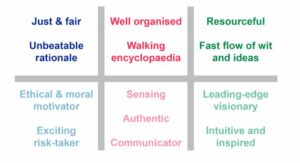When Leadership Goes Wrong – The Importance of Leadership
When leadership goes wrong, organisations fail. It’s as simple as that.
At the top of every well-functioning team or business is a great leader. Good leadership is essential for an organisation to thrive, but unfortunately good leaders are hard to come by.
Well-conducted leadership is vitally important for a plethora of reasons. It holds together the morale of the team and inspires its members. It provides a driving force for innovation, and ensures that a high level of communication is maintained within the organisation.
The problem is that unfortunately, many leaders come up short. The skill set required from a leader is much broader than it is for other roles within an organisation. Those being promoted into leadership from within the ranks are often missing some key pieces of the puzzle.
It can be a challenge to acquire the skills required to be a good leader. You really need some kind of map to guide you through the process.
Of course experience is the best teacher, but sometimes there isn’t enough margin of error available to allow this. Learning from experience alone takes years.
So what can you do to better inform yourself on good leadership strategy? It can be very beneficial to look at some of the most common mistakes that other leaders often make.
Examples of When Leadership Goes Wrong
In this article, six common failure points in leadership are laid out:
Lack of Presence
A leader who is not present enough in the workplace does not set a good example for their subordinates.
This is especially true if employees are expected to work long and hard hours in the absence of their leader. This builds resentment and leads to disconnection. This in turn leads to the next point of failure..
Lack of Direction
Values and goals provide the forward momentum that every organisation needs. This sense of direction needs to come primarily from the leader. If they do not provide it, motivation quickly wanes in the workforce.
If not quickly remedied, this error will always prove fatal in the long run.
Lack of Transparency
It is very important for leaders to be transparent and ready to communicate with employees. Honesty is key, especially during challenging times.
For difficult situations like layoffs or redundancies, being honest can be a challenge. But in the long run, employees will place their complete trust in the leader.
Lack of Authority
If we look at the organisation like a ship, then the leader should be at the helm. They are in charge of navigation and steering, providing direction so that everyone knows where they are going.
If this quality is missing, all members of the organisation start to become disorientated. This quickly leads to a drop in motivation.
Lack of Listening
There is a difference between hearing and listening. For the latter, leaders must actually understand what their employees are telling them.
It is vitally important that employees are able to question and challenge the leader. Sometimes, such a challenge can literally save the organisation from disaster.
Any leader who doesn’t listen properly is asking for trouble.
Lack of Trust
If leaders do not trust their subordinates, they certainly feel it. Leaders who don’t trust them will micro-manage them and breathe down their necks.
In the end, this will frustrate employees and productivity and efficiency will suffer.
Worst of all, a leader they do not trust is not a leader at all.
Leadership in Effective Intelligence
Let’s take a much broader view of the previous six examples of when leadership goes wrong. You could sum a lot of it up by saying that much of leadership is about empathy.
Try doing some more searching around online on this topic. You will see that empathy pops up often as the key established quality required in leadership.
Here at Effective Intelligence though, thanks to 45 years of insightful action-research and 150,000+ successful users of our thinking model, many of them in leadership positions, we have found that there is a lot more to leadership than just empathy.
What we have found is that to be a successful leader, what you actually need to do is to master the thinking involved, with the specific task of leadership in mind.
This goes far beyond empathy alone and provides a much fuller picture of what leadership really entails.
The Full Picture of Leadership
At Effective Intelligence, we have had extensive experience working with the leaders of organisations all across the world, from small businesses all the way up to large multinationals like Philips and Shell.
This has given us the insights required to really understand that leadership has many components, each of which is as essential as the next.
Combined with our Colour Model of thinking, this has allowed our founder, J D Rhodes, the ability to create a number of powerful conceptual tools, one of which is shown below.

Generally, this tool is called a Colour-Frame, and we can apply a specific one to any given challenging task. This particular one shows the thinking requirements for the task of Leadership.
Colour-Frames always have six components, split into three colours, with each colour having a Hard part and a Soft part.
As you can probably make out, empathy comes from the Soft Red part of the Colour-Frame. Most of the original six points mentioned earlier are in this area. Many other articles on leadership also keep the focus here.
This means that much of the current discourse on leadership has far too narrow a focus. We are missing all of the other equally important components that good leadership must have.
We hope that this Colour-Frame helps to broaden your view of what being an effective leader really means.
Do you want to discover more about how thinking affects every important task you and your team are faced with? Feel free to browse the rest of our articles. You can also see all of our Leadership articles here.
Until next time!








